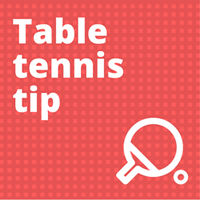Here’s a familiar scenario…
You arrive at your table tennis club, fully focused and ready for a high energy session. You know what you want to practice and who you’d like to practice with. You have 1 or 2 hours to play and you want to make the most of it.
But as you cast your eyes around the table tennis hall, you notice all your usual practice partners are already playing. Not a good start.
You then look to see if anyone else is waiting and the only other player is a much weaker than you. Your heart sinks a little.
However, you agree to knock-up. You’d rather be playing, even if it is with a weaker player, than not playing at all. But you’re not very focused. You’re just going through the motions, waiting for one of your usual partners to become available.
Before you know it, 20-30 minutes has passed and you haven’t really practiced anything at all! It feels like you’ve wasted a lot of valuable time.
We’ve all been there. It can be frustrating. But it doesn’t have to be a complete waste of time. There’s actually quite a few things you can do when practicing with a player of a much lower ability-level which will benefit your own game.
Here’s some suggestions…
Focus on a weakness
If you have a great forehand, but your backhand sucks, focus on playing with your backhand. Or if you struggle to return serves consistently, ask your partner to keep serving at you. If you have trouble attacking backspin, get your partner to keep pushing the ball and try to topspin their pushes.
Whatever your weakness, focus on this rather than a strength. There’s not much point playing with your strengths against a player of a much lower ability-level, as you will knock them off the table. So focus on a weakness and it should be a more rewarding experience for both players.
Play to their strengths
Alternatively, keep playing to their strengths. For example, if the player has a big forehand hit, give them opportunities to use this shot. You can practice blocking or counter-attacking their attacks.
Whatever they do well, let them do it. The player will feel happier because they are giving you a better work-out and you get to play against their better quality shots, rather than their low quality shots.
Practice your consistency
A much weaker player will struggle against your best shots. So don’t use them. It won’t be a good learning experience for you, as the ball will rarely be returned. And it will be frustrating for them as they will spend most of the time picking the ball off the floor.
Instead, ease off the power / speed and focus a bit more on just keep the ball on the table. Work on your touch, placement or footwork and just keep the rallies going for as long as possible. A lower ability-level player may be a bit erratic with their spin and placement, so just keeping the ball on the table can actually be quite a challenge.
Play handicap matches
If you decide to play a match, make it interesting and give your weaker opponent a points advantage. This can make the match much more enjoyable and both players have an opportunity to win.
Play up to 31. You start on 0 and your partner starts on any number which makes the match competitive. For example, if you are a lot stronger, you could give them a 22 point head start. The match then becomes much more challenging. You really have to concentrate on every point.
Give advice
If the weaker player is clearly doing something technically wrong, don’t just stand there is silence, tell them! If they keep putting backspin balls in the net, tell them why. If they keep blocking topspin shots long, tell them how to keep the ball on the table.
You don’t have to become their coach or give them a long instructional lecture. Just give them some tips so they don’t keep making the same mistake. They will appreciate any advice you give them, as it will help them improve.
Final thoughts
If you are only able to practice two hours per week, you don’t want to spend too much time playing with players of a much lower ability-level, otherwise you may never improve. It’s fine to play for 10-20 minutes and then switch partners.
A weaker player will usually be delighted that they have had chance to play with someone better, even just for a little bit, especially if you mentally and physically engage in the practice and don’t simply go through the motions.
And if you help the player improve by giving some tips, the next time you play together the difference in standard may be a little closer.


